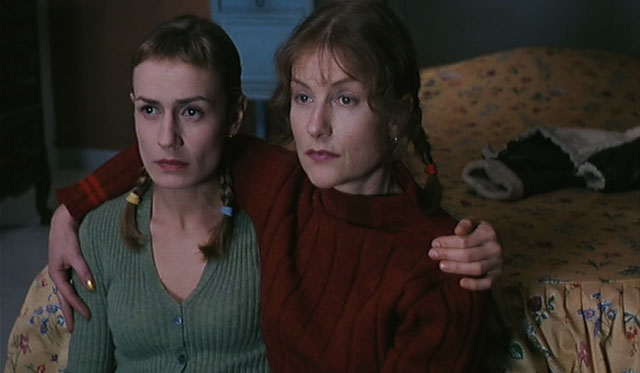First of three Chabrol memorial screenings in September. I remember liking his Le Beau Serge and L’Enfer from the dark pre-blog days, and since then I’ve greatly enjoyed La Rupture and been slightly disappointed in A Girl Cut In Two. Obviously for such a Rivette/Truffaut/Varda/Rohmer/Marker/Godard (not to mention Hitchcock) fan as myself, that’s not enough attention paid to a founding New Waver with over 50 films to his name.
The Guardian’s headline the day Chabrol’s death was announced read “Claude Chabrol anatomised the French middle class with a twist of the scalpel,” which could almost be a poster description of this movie, but maybe changed to “with a blast of the shotgun.” Immediately after watching it was impossible to avoid comparing it to Funny Games – they’re not similar in plot so much as in impact.

The great Isabelle Huppert (I wonder if Haneke had felt the Funny Games connection when he cast her in The Piano Teacher) got much attention and acclaim for this movie, but younger Sandrine Bonnaire (just off Joan the Maid) is the central character. She takes a housekeeper job for the Lelievre family (Jacqueline Bisset of Day for Night and Under the Volcano and Jean-Pierre Cassel, the amoral baddie in La Rupture), which she performs dutifully and quietly, keeping her personal life to herself, until she starts spending more time with fiery friend Huppert, a postal clerk long suspected by Cassel to be reading the family’s mail.

The two women egg each other on, growing more defiant in the faces of authority (Bonnaire’s employers, the church where Huppert volunteers) and more disturbingly, finding out about each others’ dark, possibly murderous pasts. Seems like a hard place to keep secrets, and Bonnaire’s past has managed to follow her into these distant suburbs. But the one thing she doesn’t want discovered is her illiteracy, so when the family daughter (Virginie Ledoyen of Cold Water & 8 Women) finds out and threatens to tell, it’s the beginning of the end.
Possibly dyslexic Bonnaire trying to read a note… filmed in a mirror (nice touch)

Sure I noticed the blatant introduction of shotguns into the movie earlier (Cassel cleans them in prep for a hunting outing) but I didn’t quite think it would come to this: Bonnaire and Huppert sneak into the house after Bonnaire has been fired for threatening the daughter, and they quietly trash the place while the family watches opera on television, each pretending to enjoy the opera for the sake of the others (that’s how it seemed to me anyway – and I think Cassel really does enjoy it). Then, when discovered stalking the kitchen with shotguns in hand, they blow away the entire family. Also didn’t see coming, despite the blatant early introduction of Huppert’s car troubles, that her getaway stalls in the middle of the road and she’s killed by oncoming traffic (her former employer the priest drove the other vehicle). Killer finale: as Bonnaire walks past the accident scene, emergency workers play the tape machine recovered from Huppert’s car, which was set up by the family son to record the opera but instead faithfully recorded the entire crime.

NY Times: “When Sophie arrives by train to begin her new job, she turns up on the wrong side of the tracks. This film takes quiet, devilish pleasure in every such hint of something awry. For instance, there is the impassive way that Sophie behaves around the Lelievres, and how it contrasts with her coarse, ravenous manner when she’s eating alone.” Senses of Cinema: “In crime fiction, criminal behaviour is often not so much a result of free agency as something determined by psychological and social factors. However, in Chabrol, the urge to explain crime is undermined by the competing view that evil itself is unexplainable. Sophie and Jeanne’s illicit behaviour is not simply a compulsive backlash against class inequality but a curiously ordained ritual.”
Bonnaire likes to watch movies on the TV in her room – I recognized Stéphane Audran from La Rupture in one of them, and sure enough it’s 1970’s Chabrol film Wedding In Blood they are viewing.
